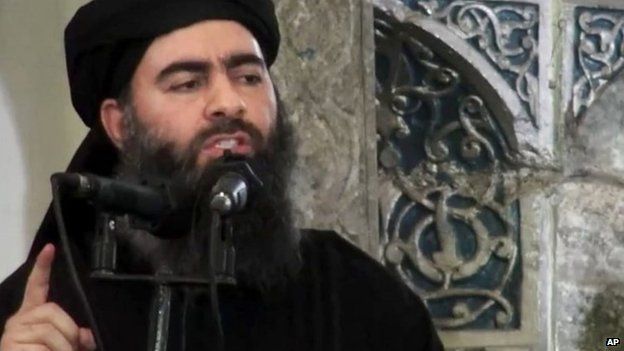Lebanon detains Islamic State leader Baghdadi's wife
- Published

Lebanese security forces have detained a wife and young child of Islamic State (IS) leader Abu Bakr al-Baghdadi near the border with Syria, the army says.
The pair were picked up by military intelligence after entering Lebanon with forged papers 10 days ago.
Baghdadi's wife - identified as an Iraqi national - is being questioned at the defence ministry.
In June, Baghdadi was named the leader of the "caliphate" created by IS in the parts of Syria and Iraq it controls.
Last month the group denied reports that he had been killed or injured in an air strike by US-led forces near the northern Iraqi city of Mosul.
DNA test
Describing them as "a valuable catch", the Lebanese newspaper al-Safir said that the IS leader's wife and child had been detained in co-ordination with "foreign intelligence services".
They were held at a border crossing near the north-eastern town of Arsal while trying to enter Lebanon.
They were currently being held for interrogation at the defence ministry's headquarters in al-Yarza, in the hills overlooking Beirut, it added.
There were conflicting reports about the child, with a senior Lebanese security official telling Reuters news agency it was a girl - a direct contradiction of most news reports.
A DNA test is being carried out to confirm the child is Baghdadi's.
Lebanese officials initially said the woman was Syrian, but later identified her as an Iraqi called Saja al-Dulaimi, who had been living in Syria.
A woman with that name was detained by the Syrian authorities before being freed in March as part of a prisoner exchange with al-Qaeda's local affiliate, al-Nusra Front.
The exchange saw Islamic State's rival hand over a group of abducted Greek Orthodox nuns in return for the release of 150 of the Syrian government's female prisoners.
Analysis: Jim Muir, BBC News, Beirut
Assuming the reports are true - and there is little reason to doubt them - the Lebanese authorities now face the delicate question of what to do with Abu Bakr al-Baghdadi's wife and offspring.
In theory, they could prove a useful bargaining chip in the highly-charged imbroglio surrounding the fate of more than 20 Lebanese Army soldiers held hostage since August by IS and the rival al-Qaeda-linked militant group, al-Nusra Front.
The militants are demanding the release of Islamist prisoners in Lebanese jails to spare the soldiers' lives - three have already been murdered.
But al-Nusra has been much more involved than IS in back-channel negotiations for a possible exchange, so there is no guarantee it would pay off.
And there is always the possibility that the continued detention of the pair could provoke IS to seek revenge in one way or another, perhaps by seizing more hostages.
'Powerful card'
A US government source told Reuters that it was not sure how recently the woman had been with Baghdadi, and how much information, if any, she might have.
However, a Lebanese official said the arrest was a "powerful card to apply pressure" in the hostage negotiations with IS and al-Nusra.
Very little is known about Abu Bakr al-Baghdadi, who has not been seen in public since being filmed delivering a sermon at a mosque in the northern Iraqi city of Mosul in July.
A profile published by IS supporters that month said the Iraqi was married, but it is unclear how many wives he has.
Tribal sources in Iraq told Reuters he had three wives - two Iraqis and one Syrian. Under Islamic law he is allowed up to four.
The US has offered a $10m (£6.4m) reward for information leading to the capture or killing of Baghdadi, whose real name is Ibrahim Awwad Ibrahim Ali al-Badri al-Samarrai.
After rumours of his death emerged last month, IS released an audio recording purportedly of Baghdadi in which he claimed that the caliphate was expanding and called for "volcanoes of jihad" to erupt the world over.